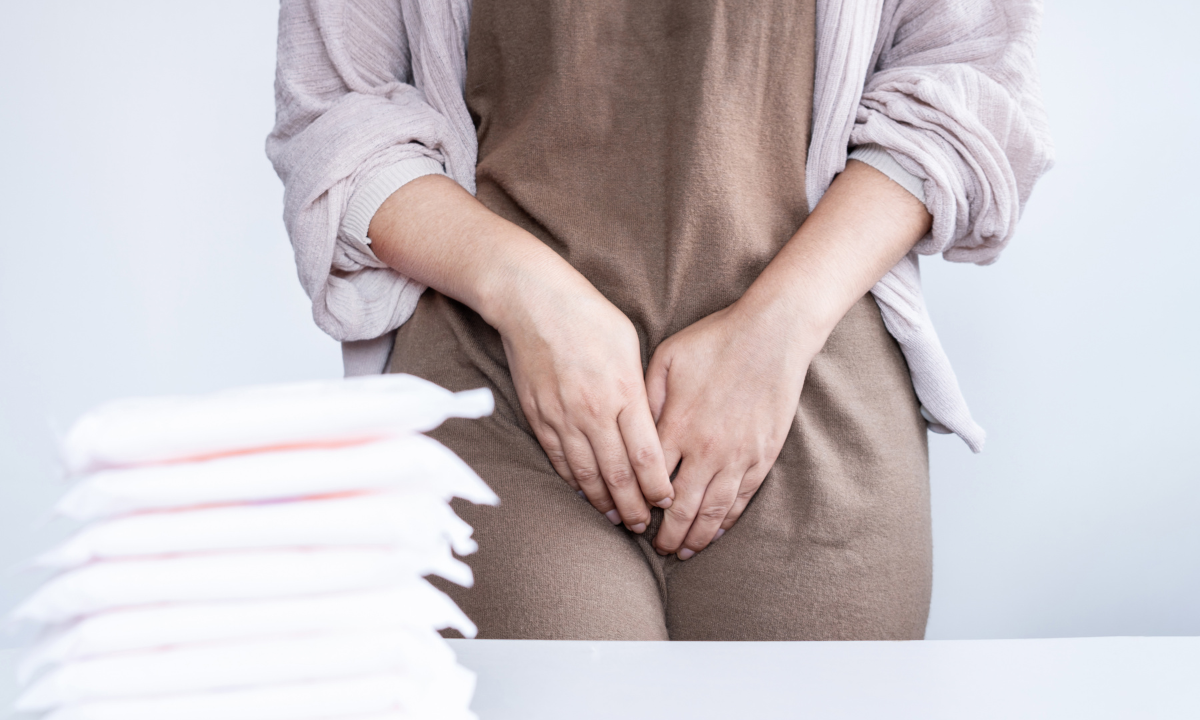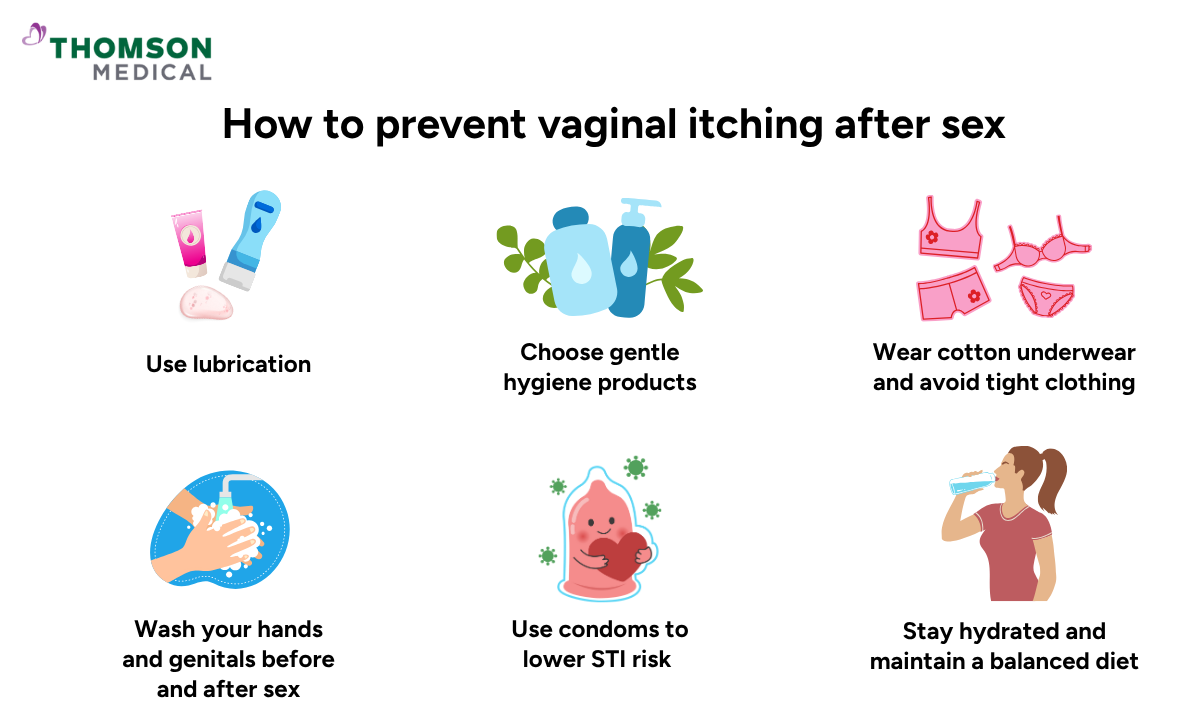Vaginal itching after sex is very common in women. There is usually nothing to worry about if the itching is mild and goes away quickly on its own. However, if it keeps coming back or feels more intense, it could be your body’s way of saying that something isn’t quite right.
Understanding what might be causing vaginal itching and knowing when to seek help are key to restoring comfort and protecting your reproductive health.
Is it normal for the vagina to itch after sex?
Occasional mild itching after sex is normal, especially if it is caused by friction, dryness or sensitivity to products such as lubricants or condoms.
However, if the itching is consistent or intense, it’s not normal. It may be a sign of an infection, irritation,or an allergic reaction. In this case, it’s important to talk to your doctor.
It’s natural to feel awkward or embarrassed, but it’s just a part of your well-being. Seeking advice from sexual health clinics can give you peace of mind and help you take better care of yourself.
What causes vaginal itching after sex?
There are a few common reasons why you feel itchy after sex. The good news is that most of them are treatable once you know what’s going on.
Your itching can be caused by:
Friction and dryness:
Vaginal dryness due to lack of lubrication during sex can cause irritation and itching. This is common, especially during menopause, breastfeeding, or when you are taking certain medications.
Allergic reactions or sensitivities:
Sometimes, the products you use during sex can be the main cause. Latex condoms, lubricants, spermicides or even scented soaps may trigger irritation and allergic reactions.
Yeast infections (candidiasis):
If you notice thick white discharge along with an itching and burning sensation, it may be yeast infection symptoms. These signs often get worse after intercourse.
Bacterial vaginosis:
When the natural balance of bacteria in your vagina changes, it can lead to itching with an unusual odour and greyish discharge.
Sexually transmitted infections (STIs):
Infections, such as trichomoniasis, chlamydia, or gonorrhoea, can lead to itching, discharge, and discomfort.
Hormonal changes:
During menopause or pregnancy, your oestrogen levels, vaginal pH, and moisture can change. These symptoms may make your vaginal area drier and more sensitive than usual, leading to irritation.
Skin conditions:
Some conditions, such as eczema, lichen sclerosus or dermatitis, can affect the vulva and worsen after sex.
Vaginal itching after sex can happen for many reasons. Some causes are temporary, while others may indicate an underlying infection. Knowing the difference helps you listen to your body and catch any unusual changes early.
Symptoms to watch for with post-sex itching
Vaginal itching is common, but you should pay attention if it comes along with other symptoms. These could be a sign of an infection or another condition that requires medical care. Most of these conditions are treatable once properly diagnosed, so don't hesitate to seek care.
Here are some common signs you should look out for:
Unusual vaginal discharge (yellow, green, or foul-smelling)
Vaginal burning or pain during urination
Rash, sores, or blisters around the genital area
Pelvic pain or lower abdominal cramping
Persistent redness or swelling
When should you see a doctor about vaginal itching?

If your itching doesn’t improve after a few days, or if it’s severe, or you start noticing other unusual signs, it’s time to talk to your doctor.
Generally, you should get medical advice if:
The itching is severe or persistent
It recurs after most sexual encounters
You notice abnormal discharge, odour or pain
You suspect an allergic reaction to condoms or lubricants
You and your partner may have been exposed to an STI
Getting things checked early is one of the best ways to protect the overall well-being of both you and your partners.
Even if the signs seem small, seeking medical attention can give you peace of mind and help prevent things from getting worse later on.
If you’re unsure about what’s causing your vaginal irritation or itching, don’t wait too long to get it checked. Request an appointment with our specialist to receive personalised advice and the right treatment for your needs.
Our sexual health specialists
Loading...
How is the cause diagnosed?
Depending on the symptoms, your healthcare provider may suggest suitable tests and diagnoses.
These can include:
Medical history review:
Your doctor may ask about your sexual activity, contraception, and hygiene practices
Pelvic examination:
It helps your doctor look for signs of infection or irritation
Lab tests:
They can include swabs, cultures or pH testing to identify yeast, bacteria or STIs
The results will help your doctor identify the root cause and guide you toward the right care so you can get back to feeling comfortable again.
Treatment for vaginal itching after sex
Once your doctor finds out what’s behind your itching, they’ll suggest the treatment plan that suits you.
Here are some common approaches:
Friction or dryness:
Using lubricants, longer foreplay, or vaginal moisturisers can help reduce irritation and improve vaginal dryness.
Allergic reactions:
If the product you use during sex is causing your itching, consider switching to hypoallergenic condoms or lubricants.
Yeast infections:
Vaginal yeast infections are usually treated with antifungal creams, suppositories, or oral medications.
Bacterial vaginosis
If your itching is caused by bacterial vaginosis, your doctor will suggest that you use antibiotic creams or oral medication to restore the balance.
STIs
These often require prescription antibiotics or antivirals, depending on the infection.
Hormonal changes
If your itching is related to menopause, your doctor will recommend vaginal oestrogen therapy. This can help relieve dryness and other menopause symptoms that cause discomfort.
While over-the-counter creams may provide temporary relief, it’s best to see your doctor for a proper diagnosis. This way, you'll get personalised care and feel better faster.
If the symptoms still persist even after treatment, don’t hesitate to follow up with your healthcare provider.
How to prevent vaginal itching after sex?

A few simple habits can make a real difference in helping you prevent vaginal itching after sex:
Use adequate lubrication to reduce friction
Choose unscented and gentle hygiene products
Wear cotton underwear and avoid tight clothing
Wash your hands, and genitals before and after sex
Use condoms to lower STI risk and switch brands if irritation occurs
Stay hydrated and maintain a balanced diet to support vaginal health.
Taking care of your vaginal health doesn’t have to be complicated. Small changes in your routine can help you feel more comfortable and confident after sex.
Want to stay proactive about your sexual health?Request an appointment with Thomson Medical today for further testing and personalised care.
FAQ
Why does my vagina itch only sometimes after sex?
Vaginal itching may occur due to inconsistent lubrication, occasional irritation from condoms or lubricants or changes in hormonal levels.
If it happens often, check with your doctor as soon as possible for medical advice.
Can condoms cause vaginal itching?
Yes. Latex allergies or reactions to lubricants and spermicides in condoms can cause itching. If it happens to you, switch to non-latex or hypoallergenic condom to see if the irritation improves.
How do I know if itching is from a yeast infection?
Yeast infections typically cause intense itching, burning, and a thick white discharge, which looks like cottage cheese.
When you notice these symptoms, it’s a good idea to see your healthcare provider for testing. It’s the only way to know for sure. If you get infected, your doctor will prescribe antifungal medication for you.
Is vaginal itching after sex more common during pregnancy or menopause?
Yes, hormonal changes during pregnancy or menopause can cause vaginal dryness and pH imbalance, leading to irritation and itching in vaginal area.
How do I stop itching after sex?
If it’s your first time feeling itchy, try a cool compress, and avoid scratching. Wearing loose cotton underwear and using gentle, unscented products can be useful, too.
If the itching keeps coming back, it’s best to seek medical care from your healthcare provider.
How long does itching last after having sex?
Usually, mild irritation of vagina after sex may resolve within a few hours to a day. If the itching lasts longer than a day or gets worse, consult your doctor to find out the cause and get treatment promptly.
The information provided is intended for general guidance only and should not be considered medical advice. For personalised recommendations and tailored advice based on your unique situations, please consult a specialist at Thomson Medical. Request an appointment with Thomson Medical today.
For more information, contact us:
Thomson Specialists (Women's Health)
Thomson Women's Clinic (TWC)
- Novena:
6592 6686 (Call), 8611 8986 (WA) - Bukit Batok:
6569 0668 (Call), 8686 3525 (WA) - Choa Chu Kang:
6893 1227 (Call), 8282 1796 (WA) Jurong:
6262 8588 (Call), 6262 8588 (WA)- Katong (female doctor):
6970 2272 (Call), 8611 9020 (WA) - Punggol:
6243 6843 (Call), 8811 0328 (WA) - Sembawang: 6753 5228
- Sengkang: 6388 8125
- Serangoon (female doctor): 6382 3313
- Tampines: 6857 6266
- Tiong Bahru: 6276 1525
